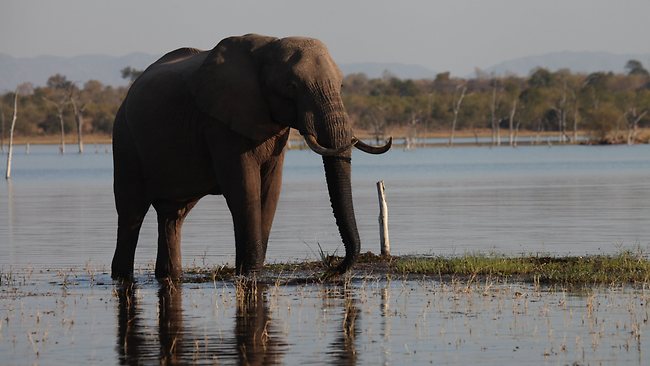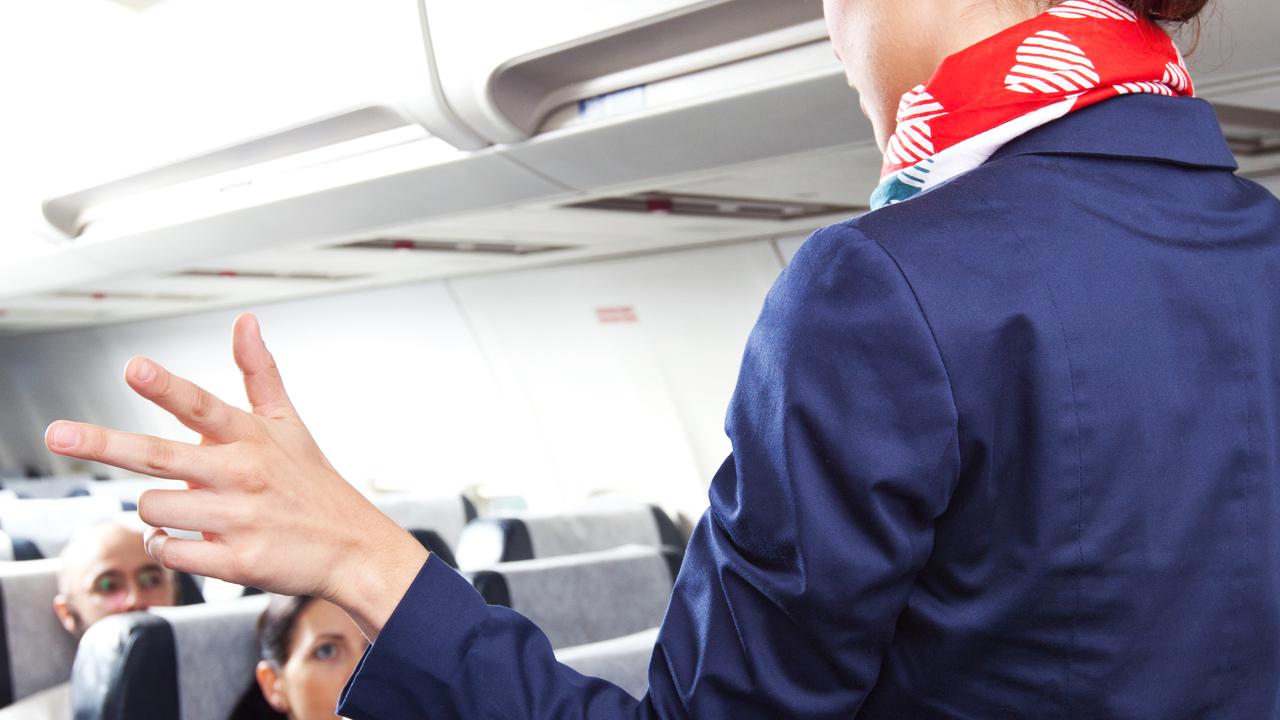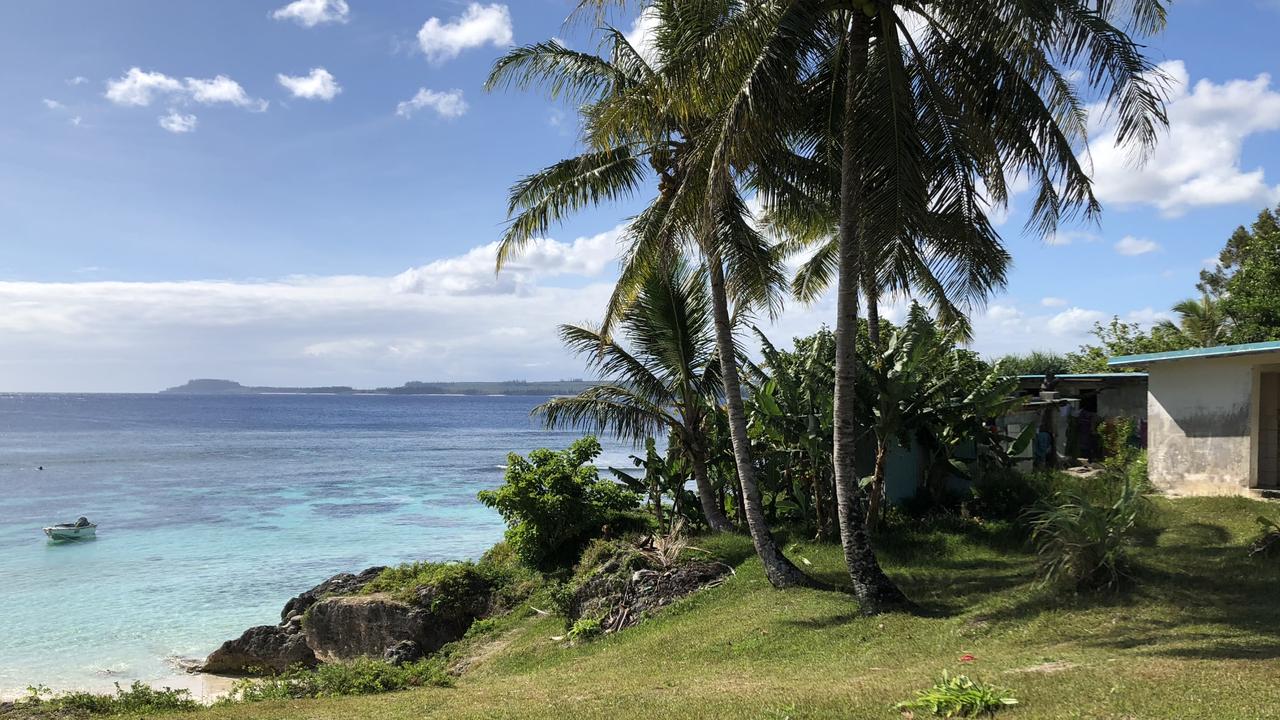Author Tony Park's Zimbabwe
THE novelist specialising in African tales sees its wildlife from a different perspective from onboard a houseboat in the Kariba landscape.

DESPITE their enormous size, the elephants' footsteps are barely audible as we drift silently alongside the herd, holding our breath as we keep pace with them just a few metres away.
We are watching big game in Africa but instead of bouncing about in the back of a Land Rover, we're on the water, on an aluminium platform bobbing on pontoons, on the waters of Lake Kariba in Zimbabwe. An afternoon boat cruise, watching animals, is part of the daily routine on the houseboat Return to Eden, which we have chartered from the town of Kariba, on the shores of the lake that divides Zimbabwe from Zambia. Lake Kariba was formed in 1959 when the Zambezi River was dammed for a hydro-electricity project. The Zambezi Valley was rich in wildlife and the rising floodwaters turned hilltops into islands, stranding thousands of antelope, rhinos, big cats and other wild animals. The Government of Rhodesia (as Zimbabwe was then known) launched Operation Noah, in which volunteers in small boats rescued those animals and relocated them to the new Matusadona National Park on the lake's shore. The Matusadona hills, from which the park takes its name, glow a striking pink in the dawn and dusk as Return to Eden's captain, Satiel, pilots us around the dead trees that still poke through the lake's waters, more than 50 years after they were flooded. A houseboat on Lake Kariba bears little similarity to the glorified floating caravans found on Australian waterways. More ship than boat, it boasts six cabins, all with airconditioning and ensuite, an enormous upper deck for dining and lazing, and even a plunge pool. Kariba's climate is warm and dry from May to October and hot, sticky and wet over the summer but even at the hottest times there is usually a refreshing breeze. Covering more than 5000sq km, it is the world's largest man-made reservoir. As Australians, it's hard not to think of the 1980s miniseries of the same name when we board Return to Eden, and just as crocodiles played a part in that drama (James Reyne tried to kill his on-screen wife Rebecca Gilling by feeding her to one), these menacing reptiles are very much a part of the Kariba landscape. Kariba is also home to a stunning array of aquatic bird life, including pied kingfishers that hover busily over the water before nosediving in for the kill, and majestic fish eagles whose mournful wail is for many the sound of Africa. We have booked Return to Eden on a self-catering basis, but the operators can also provide all meals. Self-catering really just means we bring our own food; we don't need to cook it because chef Chris is ready to turn our basic ingredients into some creative fare. Matusadona is a long, narrow reserve on the Zimbabwean side of the lake and is famed for its lions, elephants and buffalos. We hear lions and hyenas calling at night and see elephants by day. The honking of hippos is constant and in every bay we see their wiggling ears and beady eyes. In the early morning and late afternoon, Captain Satiel and deckhand Panache take the passengers out on two tender boats, with one group opting to go game viewing and the other fishing. The lake provides food in the form of tiny kapenta (similar to whitebait), reasonable-sized bream, and a sport fisherman's dream in the hard-fighting, razor-toothed tiger fish. While watching some birds, Panache hears the crack of a breaking branch that signals elephants are nearby. We're in a narrow inlet and there is little room to manoeuvre. When the elephant herd's matriarch first catches sight of us, she raises her trunk to sniff for danger. Deciding we mean her no harm, she leads her brood to the water's edge to drink. When they move off, Panache leaves the outboard switched off and paddles a couple of strokes so that we drift alongside them. It's a magic moment, made more so by the fact that the elephants have come to us, rather than us being in a vehicle chasing after them through the bush. In the five days we spend on the boat, Captain Satiel moves Return to Eden during the middle of each day from bay to bay and the short voyages allow him and us to charge our batteries. We plug in our cameras and laze on sunbeds, soaking up the sun in swimming costumes in the middle of winter as the diesel engines hum below decks. At Tashinga camp, the headquarters of Matusadona National Park, we leave the boat for a short excursion ashore, taking a guided bushwalk with park rangers Macaroni (yes, Macaroni) and Ronald. We see hippos, waterbucks and jackals, and visit a hyena's lair in a rocky cleft. On a previous visit to Tashinga, I had seen a semi-tame black rhino near camp, an orphan that had been hand-reared by rangers after her mother had been killed by poachers for her horn. Recent claims by a Vietnamese government minister that rhino horn cured his cancer are thought to be behind the current spike in demand for horn. I ask Ronald if the rhino is still in the area. "It has gone wild," he replies, and I hope that doesn't mean it was killed. Black rhinos are critically endangered in Zimbabwe, but he assures me they are still present in Matusadona and our crew confirms they occasionally see these shy, endangered animals from the boat. A couple of years ago, Zimbabwe traded its worthless currency for the US greenback, which brought a measure of stability to trade, if not a solution to the country's problems. It's now easier for tourists to return to this country and its many lost paradises. When we get back to the port of Kariba, it's an effort to leave the boat. We haven't ticked off all of Africa's big game species, but we've chilled and lazed and eaten to excess, and the encounters we have had with animals have been quietly intimate and memorable. -- Tony Park is the author of nine novels set in Africa. His latest, African Dawn, is set in Zimbabwe. He travelled on Lake Kariba courtesy of return-to-eden.com



